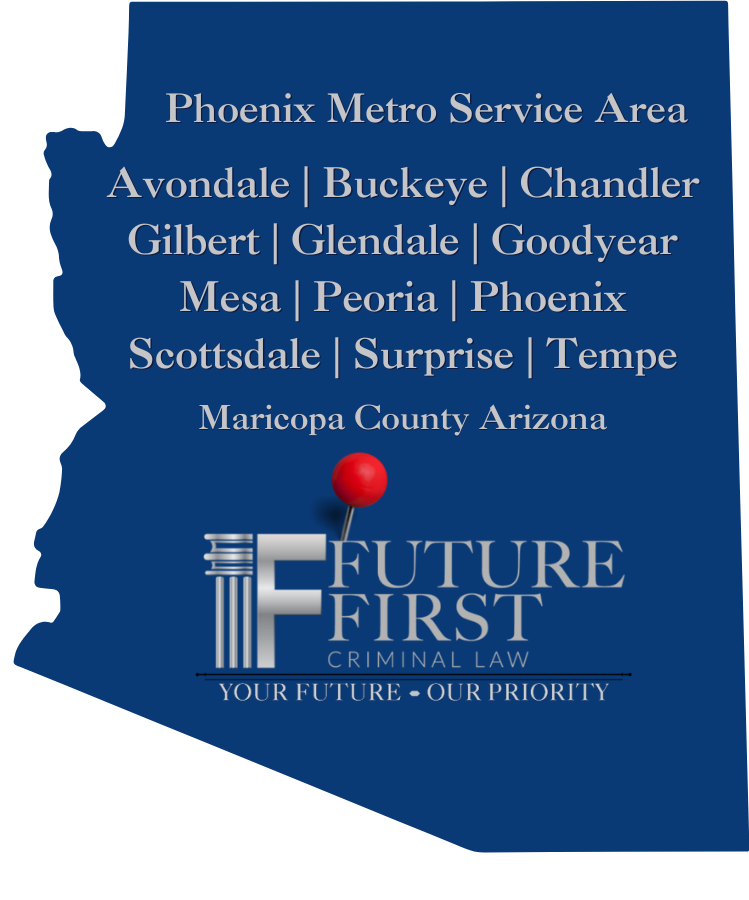Areas of Practice
- DUI
- Criminal Defense
- Assault & Battery
- Burglary/Theft
- Drug Related Charges
- Expungement/Sealing Records
- Marijuana Violations
![]() Discover the power of strong legal representation with Future First Criminal Law. Getting pulled over for a DUI in Phoenix, AZ can lead to severe consequences, including jail time and possibly a permanent criminal record. Our experienced DUI and Criminal Defense Lawyers are here to fight for your rights and navigate the legal process on your behalf. With our tough and aggressive representation, we aim to minimize the impact on your future. Don’t face the challenges alone – contact us today for a free phone consultation. Top-Rated Arizona Lawyers dedicated to DUI and Criminal Law.
Discover the power of strong legal representation with Future First Criminal Law. Getting pulled over for a DUI in Phoenix, AZ can lead to severe consequences, including jail time and possibly a permanent criminal record. Our experienced DUI and Criminal Defense Lawyers are here to fight for your rights and navigate the legal process on your behalf. With our tough and aggressive representation, we aim to minimize the impact on your future. Don’t face the challenges alone – contact us today for a free phone consultation. Top-Rated Arizona Lawyers dedicated to DUI and Criminal Law.
![]() Future First Criminal Law, your trusted partner in navigating the complex world of criminal defense. We understand that the “criminal justice system” may seem daunting, with various individuals and government agencies working to obtain a conviction. But fear not, for our experienced criminal defense lawyers are here to level the playing field. You’re not alone in this process—our team collaborates to guide you every step of the way. Whether it’s before, during, or after an arrest, we will be by your side, analyzing evidence, strategizing defense, and fighting for your rights. Don’t face the system alone; contact us today for a free phone consultation.
Future First Criminal Law, your trusted partner in navigating the complex world of criminal defense. We understand that the “criminal justice system” may seem daunting, with various individuals and government agencies working to obtain a conviction. But fear not, for our experienced criminal defense lawyers are here to level the playing field. You’re not alone in this process—our team collaborates to guide you every step of the way. Whether it’s before, during, or after an arrest, we will be by your side, analyzing evidence, strategizing defense, and fighting for your rights. Don’t face the system alone; contact us today for a free phone consultation.
![]() Assault is a devastating crime that inflicts physical, emotional, and psychological pain on its victims. The consequences of an assault conviction are severe and wide-ranging, including jail time, hefty fines, community service, and mandatory counseling. Moreover, the repercussions extend beyond the legal realm, with the perpetrator’s reputation tarnished in both the community and the workplace. Economic opportunities may be limited, and wages may suffer throughout their career. When faced with an arrest or charge for assault, it is vital to seek the assistance of a skilled Phoenix assault defense lawyer without delay. Attempting to navigate the complex legal system alone is unwise. A knowledgeable lawyer will protect your rights, guide you through your options, and provide you with the best chance of fighting or reducing the charges. Don’t face this battle alone – call an experienced defense lawyer today.
Assault is a devastating crime that inflicts physical, emotional, and psychological pain on its victims. The consequences of an assault conviction are severe and wide-ranging, including jail time, hefty fines, community service, and mandatory counseling. Moreover, the repercussions extend beyond the legal realm, with the perpetrator’s reputation tarnished in both the community and the workplace. Economic opportunities may be limited, and wages may suffer throughout their career. When faced with an arrest or charge for assault, it is vital to seek the assistance of a skilled Phoenix assault defense lawyer without delay. Attempting to navigate the complex legal system alone is unwise. A knowledgeable lawyer will protect your rights, guide you through your options, and provide you with the best chance of fighting or reducing the charges. Don’t face this battle alone – call an experienced defense lawyer today.
![]()
Burglary is a grave offense in Phoenix, and it holds the same weight across Arizona. As stated in A.R.S. §13-1506, §13-1507, and §13-1508, it occurs when someone deliberately enters a property unlawfully, intending to commit theft or a felony. First-degree Burglary refers to entering a residential building without a weapon or dangerous instrument. Second-degree Burglary pertains to entering a residential structure without a weapon. Third-degree Burglary involves unlawfully entering a fenced residential yard, commercial area, or a motor vehicle by manipulation. At Future First Criminal Law, we understand the seriousness of burglary charges and are committed to providing you with expert legal representation for optimal defense.
Unlawful Distribution | Possession | Sales
![]()
Trust Future First Criminal Law for unparalleled expertise and a track record of success. As dedicated legal professionals, we have successfully defended countless Drug Possession clients, safeguarding their families, reputations, and futures. Seek a fair fighting chance and achieve positive outcomes by reaching out to our skilled team. Contact us today to talk about our Effective Drug Possession Defense Strategies and let our experienced DUI lawyers navigate your legal situation with professionalism and dedication.
![]()
Explore the groundbreaking Arizona sealing records law! Secure a clean slate by permanently sealing your arrest record or conviction. From job applications to custody battles, and from gun rights to civil rights, this law automatically restores everything. The advantages are immeasurable. Whether it’s a future job opportunity, a potential advancement, or navigating a divorce, you can now leave behind concerns about the impact of a past conviction on your life. With our expert legal support, your gun rights and civil rights will be reinstated seamlessly. Timing is crucial, and entrusting the process to a lawyer is essential. Mishandling the application could result in an additional 3-year waiting period before reapplication. Safeguard your future wisely. Contact Future First Criminal Law today and initiate your journey to a fresh start—take the initial step to seal your record and safeguard your future now!
![]()
New Arizona Marijuana Laws
Under Prop 207, Arizona residents aged 21 and older can legally consume and cultivate marijuana for recreational purposes. The Secretary of State certified the approval of Proposition 207 at the end of 2020, making the Smart and Safe Arizona Act effective for regulating adult use and taxation of marijuana in the state. Licensed dispensaries are authorized to sell marijuana under this law.
Here are some key points to know about Arizona’s new marijuana law, also known as the Smart and Safe Act (SSAA) or Prop 207.
- Effective November 30, 2020, adults aged twenty-one and older can possess up to one ounce of marijuana, with no more than five grams of it being marijuana concentrate (extracts).
- Home cultivation is permitted, limited to six plants at an individual’s primary residence.
- Marijuana use remains prohibited in public places such as restaurants, hotels, and sidewalks. Smoking or vaping marijuana in open spaces, parks, and other public areas is not allowed.
- Smoking in a public place is considered a petty offense, punishable by a fine but not jail time.
- While it is not a crime to be in public under the influence of marijuana, operating a vehicle, aircraft, or watercraft while impaired by marijuana remains illegal, subject to a zero-tolerance rule.
Most Marijuana violations charged prior to the new law can be Sealed or even Expunged. CALL US TODAY to find out if your charge(s) qualify for sealing records!! We are here to help!
Future First Criminal Law
Why You Need Us On Your Side
- It’s not a fair fight. The “criminal justice system” is a powerful collaboration of individuals and government agencies working together toward one goal: to obtain a criminal conviction. The police and the prosecutor share information and work together as a team on a criminal case before, during, and after an arrest is made. Anyone who tries to take on the system alone is at a distinct disadvantage. Having an experienced criminal defense lawyer on your side helps to level the playing field.
- The goal of a police investigation is to find evidence against you. Police investigations are to get convictions, not to find the truth. Police officers, being trained to do one thing when investigating a crime: obtain evidence for use in criminal prosecution. Your defense lawyer’s investigation, on the other hand, serves a different purpose to find holes in the prosecution’s evidence, gaps in proof, inconsistencies, and other discrepancies that may give rise to reasonable doubt.
- Police officers sometimes overreach. Did the officers’ conduct, in connection with your arrest or with gathering the evidence against you, violate your constitutional rights? If so, your defense lawyer can ask a judge to throw out (or “suppress”) the unlawfully obtained evidence before your case goes to trial.
- The laws and procedures that govern a criminal case are complicated; unless you have studied the law, it is difficult to know and remember all of your rights or when those rights have are being violated. An experienced criminal defense lawyer will stand between you and the government, assert your rights and protect you from an overzealous prosecutor.
- The decisions you make will have long-term consequences. Much is at stake in criminal prosecution. A knowledgeable criminal defense lawyer can offer wise counsel based on experience to help you make the many strategic decisions you are faced with as your case winds its way through the criminal process.
Arizona Criminal Procedure
1. Arrest
First, there has been an arrest against you; this means that the police took you into custody and think you are guilty of a crime. Before the police are allowed to ask you any questions about any crime they think you might be involved in or have knowledge of, they are required to read you your “Miranda warnings.”
2. Reading Your Rights
At some point, the police should have told you that you have a right to remain silent, that anything you say can be used against you, and that you have a right to speak with an attorney and police should have also told you that if you cannot afford an attorney, one will be provided for you. Your attorney needs to know when this happened.
3. Booking
After you are taken into custody the police will take your photograph and fingerprints. Call a lawyer immediately. If you do not know a lawyer, call a family member to schedule a consultation with a lawyer. Do not tell your family member any details about the case – only calls with your lawyer are confidential while in jail.
4. Arraignment
Within 48 hours of your arrest, you will be arraigned by a judge. This is where the prosecutor tells the court why you have been arrested. At the arraignment, the judge only wants to know whether you plead guilty, not guilty, or no contest. Usually, the judge at your arraignment is not the judge who will handle your case after. Telling your side of the story to the arraignment judge only helps the prosecutor so don’t talk about your case. Your bail/bond hearing may be held at the arraignment or shortly afterward.
5. Indictment
After you are arraigned and learn what you were officially arrested for, the prosecutor will show all their evidence to a grand jury (similar to a regular jury). This is an entirely one-sided proceeding. Neither you nor your lawyer is allowed to participate. If the grand jury believes there is enough evidence against you, it will issue an indictment against you. The indictment (silent “c”) is the formal charge or charges against you. The prosecutor may legally avoid the grand jury by filing a direct complaint with the court.
6. Discovery
After there are formal charges against you, you have a right to see all the evidence that the prosecutor has including questioning witnesses. This process may take several months. Towards the end of the discovery period, your lawyer and the prosecutor may begin to negotiate or bargain the charges against you. This is called “plea bargaining”.
7. Plea Bargaining
Plea Bargaining may start at any time, but generally, your lawyer will wait until they see all the evidence against you. Plea Bargaining may continue sometime until trial. Be aware that in many cases, there are sentencing laws that control how long or short a sentence may be imposed for any given type of crime and based on your prior criminal history. Your lawyer cannot change these guidelines, however, they can try negotiating a different type of charge or fewer charges which carry a lesser sentence.
8. Trial
If the grand jury hands down an indictment and your lawyer is unable to negotiate a plea with the prosecutor, there will be a trial. In a trial, the prosecutor goes first and tells their whole case to the jury, witnesses for the prosecution are heard, and evidence against you is presented. After the prosecutor is finished, your lawyer will tell your side of the story. Your lawyer will get the chance to question each of the prosecutor’s witnesses and each item of evidence presented against you. Your lawyer may use any one of several different strategies to defend you at the trial. This will all be discussed in further detail later date if your case reaches that point.
9. Sentencing
If the jury finds you guilty, it is up to the judge to determine what your sentence will be. The sentencing usually happens a few weeks after the trial ends.



 “Mr. Divelbiss is a GREAT attorney, very honest and reliable. He takes his times with every client and answers all questions and concerns. It has been a pleasure working with Mr. Divelbiss and he serves his clients very well!”
“Mr. Divelbiss is a GREAT attorney, very honest and reliable. He takes his times with every client and answers all questions and concerns. It has been a pleasure working with Mr. Divelbiss and he serves his clients very well!”